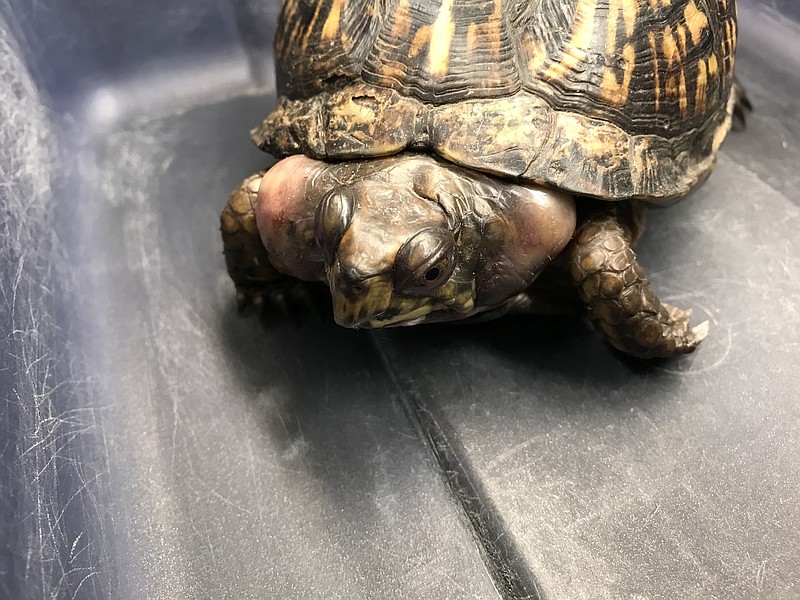Most years, Chattanooga wildlife rehabilitator Juniper Russo treats up to two box turtles suffering from upper respiratory infections.
Since March of this year, she's treated 22 turtles from the Chattanooga area with eye and ear infections at her wildlife rescue facility, For Fox Sake.
She said when turtles are deficient in vitamin A, they develop inflammation in their eyes and especially in their ears, which can cause abscesses. These types of ear and eye infections are usually seen in turtles in captivity that are fed a poor diet, but in the wild the cause tends to be long-term exposure to a group of pesticides known as organochlorines, Russo said.
DDT, an insecticide banned in the U.S. in 1972 due to its adverse effects on the environment and wildlife -- including weakening the eggs of raptors -- is one example of an organochlorine.
"Most of those pesticides were banned decades ago, but some of them are still used and are still legal," Russo said.
She believes the reason for the increase in eye and ear infections among area box turtles may be the result of someone using banned pesticides, or possibly the improper storage of a pesticide that could be contaminating the environment in the area.
"Those are things that are on my radar as possibilities that I hope we can get answers for, because in nature it's pretty rare for animals to become deficient in vitamins and minerals that are found in their natural diet, so usually there is going to be some type of external factor," Russo said. "We don't have a way to know for sure if these turtles that have these infections are deficient in vitamin A or if it is from pesticide exposure, but that is one of the things that we are expected to consider when an animal comes in with those symptoms."
(READ MORE: Chattanooga wildlife rehabilitators help care for animals in need)
Due to the dramatic increase in the number of turtles coming into her facility with infections indicating chemical exposure, Russo sounded an alarm on social media: "Something very, very bad is happening to Chattanooga's box turtles," she posted on the For Fox Sake Facebook page.
Through friends Russo connected with Matt Allender, wildlife veterinarian and director of the Wildlife Epidemiology Lab at the University of Illinois, who requested that she send him a specimen. Lily, a box turtle who recently came into For Fox Sake with an eye infection so severe that Russo and her veterinarian felt euthanasia was the best option, was shipped to Allender's lab for testing.
"Dr. Allender had considered it to be a significant enough conservation risk that he got the university to approve doing some tests and figuring out what they can do," Russo said.
She said she doesn't know when she will have an answer because the time required for this type of research can range from a few days to years, depending on what they find and the resources they have available.
"All of the vets who have treated my box turtles for these eye and ear infections have basically said the same thing, which is that this is really strange and this happens, but wonder why it's happening so much right now," she said. "None of the vets who have treated them this year have really known why we would have this really sharp increase."
Kathryn Dudeck, wildlife director at the Chattahoochee Nature Center in Roswell, Georgia, said about 18% of the turtles who came into her facility this year had swollen eyes and abscessed ears indicative of organophosphate (common insecticides) and organochlorine exposure.
She said that's average for her area, where she believes the risk of turtles developing infections from pesticides is probably greater due to the many affluent neighborhoods with residents who use regular lawn services and golf courses where fertilizers and pesticides are frequently used.
(READ MORE: Arctic fox found in Soddy-Daisy shows why keeping wildlife as pets can be a problem)
Box turtles have an average lifespan of more than 75 years, and due to their homing instinct, rehabilitators typically try to return them as close as possible to the area where they were originally found, Dudeck said.
If she sees exposure risks such as manicured lawns when returning a turtle to where it was found, Dudeck said she looks for somewhere nearby with less risk that's still within close radius.
Russo keeps track of where the turtles who come into her care were found, but she hasn't identified a particular area of Chattanooga where more turtles with infections are found than others.
Dudeck said her facility typically sees an influx of turtles with upper respiratory infections around May, when people start spraying for mosquitos and using fertilizer.
Turtles exposed to pesticides typically have eyes so swollen that they cannot open their eyes, a fair amount of discharge from both the eyes and the nostrils and abscesses on the ears. Ear abscesses sometimes grow outside the turtle's skull, but in the worst cases the abscesses grow inward, closing off the throat and leaving the turtle unable to eat or drink, she said.
Turtles can recover from these types of infections, but not on their own, Dudeck said.
To remove ear abscesses, the tissue must be surgically opened to flush out the chunks of solid mass. On the eyes, the abscesses can be compared to quarter-inch-thick contact lenses, she said.
If an ear abscess ruptures, Dudeck said the turtle is left with a gaping hole in the side of its head that takes a long time to heal.
She said turtles that develop these infections and remain in the wild often starve to death, as the condition deprives them of their sight and sense of smell that they use to find food.
If a turtle is found with swollen eyes or abscessed ears, Dudeck said it is important to get them to a licensed and trained wildlife rehabilitator as soon as possible to give it the best chance of recovery.
"Juniper and I have both had people bring animals in that they found injured or suffering from an issue, tried to treat it themselves and it prolonged the issue to the point that by the time the animals got to us they literally could not be saved," she said.
Dudeck stresses that people should avoid treating their yards with chemicals if possible.
(READ MORE: The trend of 'rewilding' yards and how it benefits Chattanooga gardeners and the globe)
Since manufacturers of trademarked insecticide formulas aren't required to reveal the full chemical composition of their products to the general public to protect their trade secrets, it's difficult to pinpoint which chemicals are causing the issue, she said.
"Personally, if I see something that says 'Keep animals and children off this for 30 days,' I don't want to be anywhere near that yard," Dudeck said, referencing the warning signs landscapers sometimes place on yards after chemical treatment.
Contact Emily Crisman at ecrisman@timesfreepress.com or 423-757-6508.

